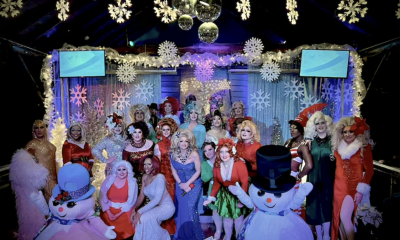Local
LGBTQ ally Hoffberger stepping down at American Visionary Art Museum
Iconic Baltimore attraction looking for a successor
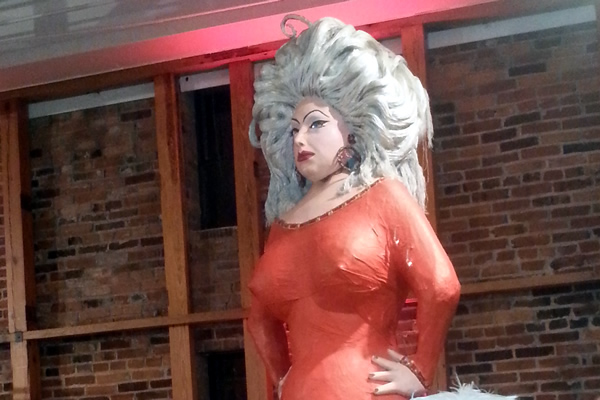
A longtime ally of the LGBTQ community is leaving her job in the arts world.
After 26 years as founder, director and primary curator of the American Visionary Art Museum in Baltimore, Rebecca Alban Hoffberger disclosed this week that she will retire in March of 2022.
In 1992, Congress designated the museum as a “national repository and educational center for visionary art,” which is defined as works “produced by self-taught individuals, usually without formal training” which arise from “an innate personal vision that revels foremost in the creative act itself.”
Rather than focusing on works of visionary art as objects unto themselves, Hoffberger curates exhibits that combine art, science, philosophy, and humor, always with an underlying focus on social justice and betterment. AVAM’s exhibits have explored themes ranging from hunger, public health and climate change to sleep and what makes us smile.
Throughout her tenure, Hoffberger has supported LGBTQ artists by featuring their work and stories in her themed exhibits and adding their work to the museum’s permanent collection. While other museums have only recently begun to call attention to their efforts to support Diversity, Equity, Inclusion and Access, AVAM has done it all along.
One of AVAM’s best known and most photographed pieces by an LGBTQ artist is British sculptor Andrew Logan’s 10-foot-tall statue of Divine, a tribute to the gay actor and Baltimore native who starred in drag in “Pink Flamingos,” “Multiple Maniacs,” “Hairspray” and other movies by filmmaker John Waters.
Logan, whose paintings and sculpture fill the Andrew Logan Museum of Sculpture between England and Wales, has two other works at AVAM: Icarus, a figure suspended above the main staircase, and the Cosmic Galaxy Egg, an eight-foot sculpture on a plaza outside the museum’s Jim Rouse Visionary Center.
Other LGBTQ artists highlighted at AVAM include painter James Snodgrass; Judy Tallwing McCarthy, an Apache leatherwoman and multi-media artist who won the first International Ms. Leather contest in 1987; Andrey Bartenev, a Russian performer, sculptor and experimentalist who won the Alternate Miss World pansexual beauty pageant in 2018 as Miss UFO; and psychic and “consciousness researcher” Ingo Douglas Swann, co-founder of the Stargate Project that was launched to investigate psychic phenomena in military and domestic intelligence applications.
Local visionary talents include woodworker Bob Little; Bob Adams, a multi-media artist and one of John Waters’ Dreamlanders, whose photographs, scrapbooks, shrines and other assemblages have been featured in three AVAM exhibits, and Bob Benson, a popular classical music radio host who became a prolific visual artist later in life, responsible for the fart machine in the museum’s Flatulence exhibit; the blinged-out Universal Tree of Life visible on Key Highway (made with Rick Ames and David Hess); the ocean beneath Icarus and the sky above him, and many other creations.
The museum has supported the LGBTQ community in other ways as well. It was one of the first places in Maryland to offer a welcoming setting for same-sex weddings, even before they were legal in the state. Couples would get married in the District of Columbia, where it was legal, and then come to AVAM’s Meditation Chapel to have a second wedding and reception.
One of Hoffberger’s year-long exhibits was called “Race, Class and Gender: 3 Things that Contribute “0” to CHARACTER (Because being a Schmuck is an equal opportunity for everyone!), also known as The Character Show. As part of that 2005-2006 presentation, she wrote an essay entitled “gender,” in which she explored the ways people in different countries think about transgender citizens; “intersex” children born with both male and female reproductive organs; gender “verification” for athletes; gender fluidity, the “gender rights” movement and related subjects.
“Every human being is precious,” she argued at the end. “We are all, all of us, part of God’s family. We all must be allowed to love each other with honor.”
The museum’s shop, Sideshow, has a gay owner whom she recruited from Chicago, Ted “Uncle Fun” Frankel, and is filled with gay-friendly books and gifts that reflect his sensibility. TripSavvy.com, a website last month named AVAM the LGBTQ+ Best Hidden Gem in Maryland. Readers of The Baltimore Sun just chose it as Baltimore’s Best Museum and Best Tourist Attraction.
In announcing her departure, Hoffberger said she loves her time at the museum but wants to pursue other interests, including writing a play about the close friendship between inventor Nikola Tesla and writer Mark Twain.
“I consider myself the luckiest woman I know,” she said. “It has been such a fantastic privilege to imagine, birth and to help our American Visionary Art Museum flourish over these past decades, alongside the most wonderful hardworking staff imaginable. Every beautiful thought, opportunity to communally inspire some greater good, we have joyfully undertaken.”
Her final curated exhibit as director will be “Healing & The Art of Compassion (And The Lack Thereof!),” scheduled for Oct. 9, 2021 to Sept. 4, 2022. A farewell gala and fundraiser has been set for Nov. 20. The museum’s board has appointed m/Oppenheim Executive Search to help find her replacement.
Waters, a big fan of the museum, is one of many who think Oppenheim doesn’t have an easy assignment.
“Rebecca Hoffberger’s name is almost synonymous with the word ‘irreplaceable,” the writer and filmmaker said in an email message.
“She has given the world the perfect museum to celebrate Baltimore’s reputation as a welcoming home to eccentric artistic outsiders and crackpot personalities,” he said. “The statue of Divine watches over the international visiting guests with benevolence and the same understanding Rebecca has for all artists who don’t fit in. Rebecca is passionate, obsessive in her drive, and nobody else could have made this place become such a major tourist destination. And now to find a successor? Who knows? We need another Glinda, the Good Witch of the Visionary. She’s out there somewhere.”
Virginia
Defying trends, new LGBTQ center opens in rural Winchester, Va.
‘It has taught me that I am not alone in this place’
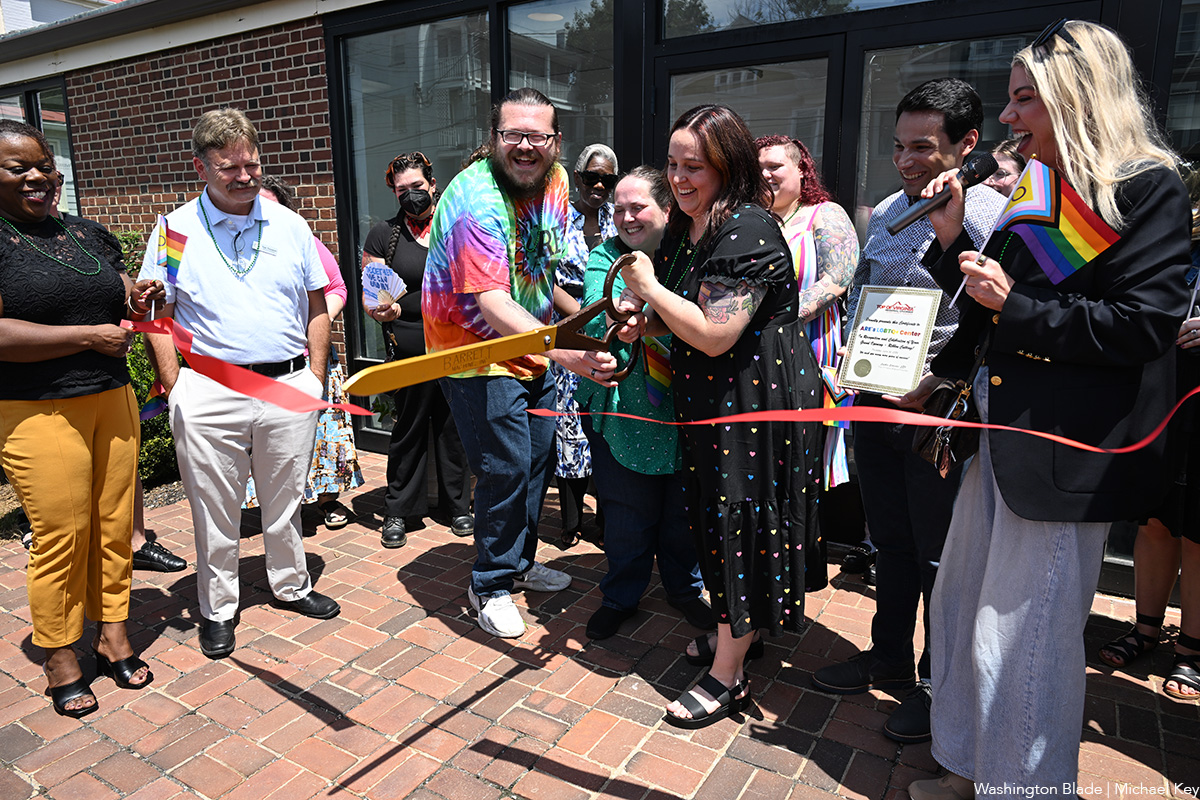
A new LGBTQ community center celebrated its grand opening on June 30 in Winchester, Va., defying recent trends amid a federal crackdown on DEI and LGBTQ funding.
The local HIV/AIDS service organization AIDS Response Effort, Inc. (ARE) worked with a team of volunteers to open the area’s first physical center.
ARE’s R.I.S.E. (Resources, Inclusion, Support and Empowerment) Center, located near the heart of Old Town Winchester on West Piccadilly Street, is more than a renovated bank building to the local LGBTQ community. The empty teller window on the side of the structure and converted vault inside give away the building’s past. But the volunteers, program participants, and well-wishers gathered at the ribbon-cutting ceremony tell the Blade that they are hopeful for a thriving future for the building — and the community.
The Washington Blade spoke with the executive director of ARE as well as the co-directors of ARE’s R.I.S.E. Center during a tour of the facility ahead of the opening.
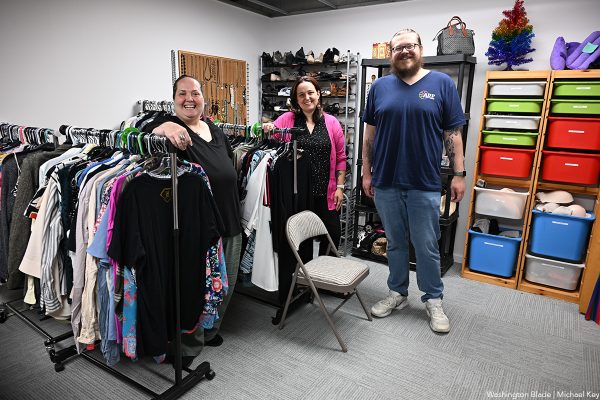
Katy Vance, executive director of ARE told the Blade, “I started [at ARE] about five years ago and we were an AIDS service organization, we have been for about 35 years now. We started as a group of volunteers out at the hospital —with Valley Health, and we’ve grown into a program that provides HIV case management for folks living with HIV in the community.”
Vance explained that as community needs have changed for service organizations like ARE, it is has led to some soul-searching among advocates.
“We had this big meeting about, ‘who are we?,’ ‘who do we want to be?,’ ‘who do we want to be in a few years?,’” Vance recalls. “As things shift and change with HIV … we have a lot of folks that come into our office who are newly diagnosed. They will get connected to a medical case manager, they’ll get on medication, and they are undetectable within one to two months, which means they are untransmittable, which is amazing.”
“So, science and technology has come so far,” Vance continued. “And so, who are we when this tends to go in the direction of no longer being the major epidemic it has been for the last 30 years, right?”
“But, when I came in, we also had a general housing program for anyone in the community,” Vance said. “That was confusing for a lot of people who came into our doors trying to figure out who we were and what we are. We called it, our ‘identity crisis,’ essentially.
“Are we an HIV service organization? Are we a housing program?” Vance asked. “So we worked with our local Goodwill and the board got together and we decided to transition our housing program out and we realized we wanted to open an LGBTQ center.”
“We have had a little bit of pushback as to why an HIV agency is opening a center,” ARE’s R.I.S.E. Center Co-Director Matt Buracker said. “Obviously, HIV and LGBT identities have a long history and a lot of stigma, but we felt like it was kind of irresponsible to talk about one without talking about the other. And we’ve always been supporting the LGBT community, so we’re just expanding our services to encompass more.”
The center seeks to serve the LGBTQ community in a county that Donald Trump carried with more than 63% of the vote in the 2024 election. While ARE receives local and state grants for its operations, the LGBTQ center is currently funded by community donations and a founders’ campaign and is staffed with volunteers.
Vance tells the Blade that the Center met its initial fundraising goal of $50,000 very quickly. The building housing the center was renovated with a combination of grants, donations and volunteer work.
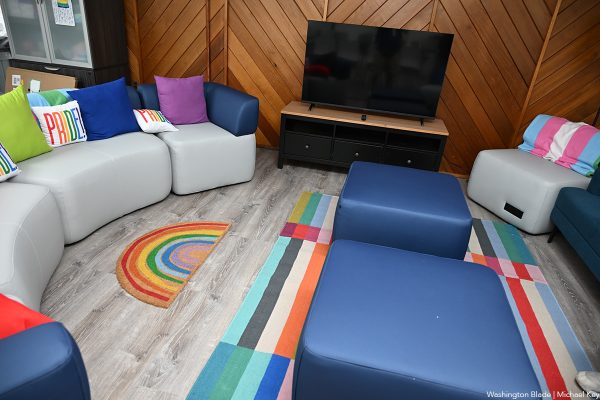
“I think our fundraising goals now are going to be more programmatic so that we can do the things that we want to do,” R.I.S.E. Center Co-Director Mary Bohacek said. “Because Matt and I are great at finding things to do for free. But there are other things that people are asking us to do, craft events or things that aren’t free to do. Eventually, we might need a license if we want to do movie screenings. So there is always going to be a fundraising need to fund the programming, but the building has been a huge success.”
“The support from the community has been overwhelming,” Buracker told the Blade. “We’ve had such a positive response from the community and it’s just it’s been so emotional to see that the need has been here and we are the one to finally do something about it.”
Vance interjected, “And of course, there are community members that aren’t a fan that are ‘keyboard warriors’ that are coming out saying stuff. What is amazing is: we had an article in the paper and they put it up on their Facebook page and people were making just terrible comments. But then, we got new volunteers from that. The community support has been, like Matt said, amazing and overwhelming.”
ARE’s R.I.S.E. Center is a member of CenterLink, a community of LGBTQ centers. Other LGBTQ community centers in the wider region include the Roanoke Diversity Center in Roanoke, Va, the Shenandoah LGBTQ Center in Staunton, Va., Diversity Richmond in Richmond, Va., NOVA Prism Center in McLean, Va., the DC Center for the LGBT Community in Washington, D.C. and the Frederick Center in Frederick, Md. A new MoCo Pride Center is scheduled to open in Bethesda, Md. in August.
While the physical building opened to the public on June 30, the R.I.S.E. Center in Winchester has held events for more than a year.
“We’ve had programming going on for almost two years now,” Bohacek told the Blade. “Our first event was a ‘Friendsgiving.’ There were so many people that showed up that we literally didn’t have enough space: we needed to knock down walls.”
The staff and volunteers at ARE and the nascent Center used that momentum to foster the growth of affinity groups, community groups and services.
Affinity groups are described as “not just support groups or social groups, but rather as something of a hybrid between the two.” As Bohacek says about the affinity groups, “if someone needs community or needs a place to talk about queer issues, they have a space to do that.”
Affinity groups hosted by the Center include a group for trans and gender non-conforming people, a group for the families of trans people, a polyamorous affinity group, an aro-ace group, a “Rainbow Connection” all-purpose group, and a “Gay-RP” affinity group for people 50 and older.
“We also have a young adult group, which is for ages 18-25, which is one of the more vulnerable sections of our community,” Bohacek said. “So we want to make sure that they have places to connect.”
As reported in the Blade, the youth advocacy organizations Hopelab and Born this Way Foundation recently issued a report that suggests LGBTQ youth (ages 15 to 24) living in rural communities face greater challenges than their suburban or urban peers in dealing with their sexual orientation or gender identity, though have significantly benefited from online resources.
“We also have some community-wide programming that allies are welcome attend,” Bohecek said. Programming includes a monthly game night, a volunteer night for the many Center volunteers, as well as the “stitch and bitch” group, who “sit, crochet, embroider and talk.”
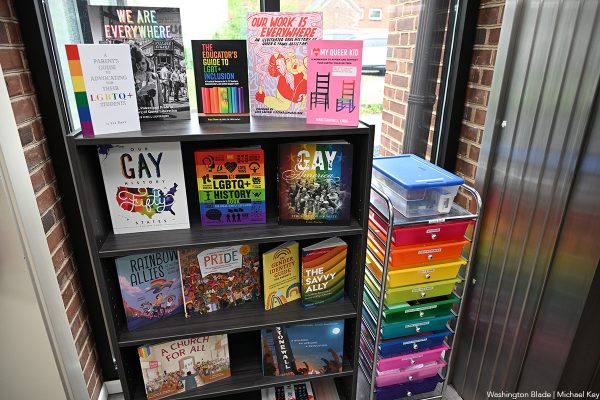
“And Coffee and Coloring!” Bohecek exclaims. “That’s one of my favorites. We like to say it’s about — just sit down, relax, have a cup of coffee — but frankly it’s about community building.”
Bohacek proudly lists the many other services the center offers, including a transgender/gender-affirming closet, which is currently overflowing with donations of clothes.
“We also have an amazing library of all kinds of identities and all kinds of ages for people to come and see,” Bohacek told the Blade. “This building is actually an old bank, so we put our books into the vault.”
The old bank, now vibrant community center, was filled to capacity for the official opening ceremony on a hot Monday afternoon in late June. People from across the Shenandoah Valley who had come to the ribbon-cutting event snacked on rainbow-colored cupcakes as they toured the renovated building.
“To be a gay man growing up in a small, rural area . . . we didn’t have anything like this,” Front Royal, Va. resident Ed McKee told the Blade. Though he lives in a town a few miles away, he works at a salon in Winchester and had come to see the new center opening.
“We didn’t have anything like this when I was growing up,” McKee said as he gestured toward the packed LGBTQ community center. “If we had, it would have made my life so much easier. I probably would have come out sooner — I didn’t come out until I was about 30 — because I would have felt the support, you know?”
“Especially now with everything that is going on in our country,” McKee continued. “We need to show strength in numbers: come together. And the center is allowing for that to happen.”
McKee’s husband, Winchester business owner Paul Miller, agreed.
“I’m hoping that [the Center] can be a great way to connect with people who might not otherwise understand how they can come together,” Miller told the Blade. “And I’m hoping that, while I’m not sure that this is its mission, I’m hoping that it has a political effect in Virginia.”
Members of the community who came to witness the opening gathered outside of ARE’s R.I.S.E. center for the ribbon cutting. Speakers at the ceremony included the Center’s co-director Bohacek.
“Today, we’re celebrating the renovation of the building,” Bohacek began. “But, we’re also celebrating the rise of this community.”
“This community has taught me resilience and it has taught me friendship and it has taught me that I am not alone in this place,” Bohacek told the crowd. “There are people that care. And we are so proud to have a place where we can be ourselves, where anyone and everyone is welcome — and we mean it. So, with that said, let’s keep on rising!”
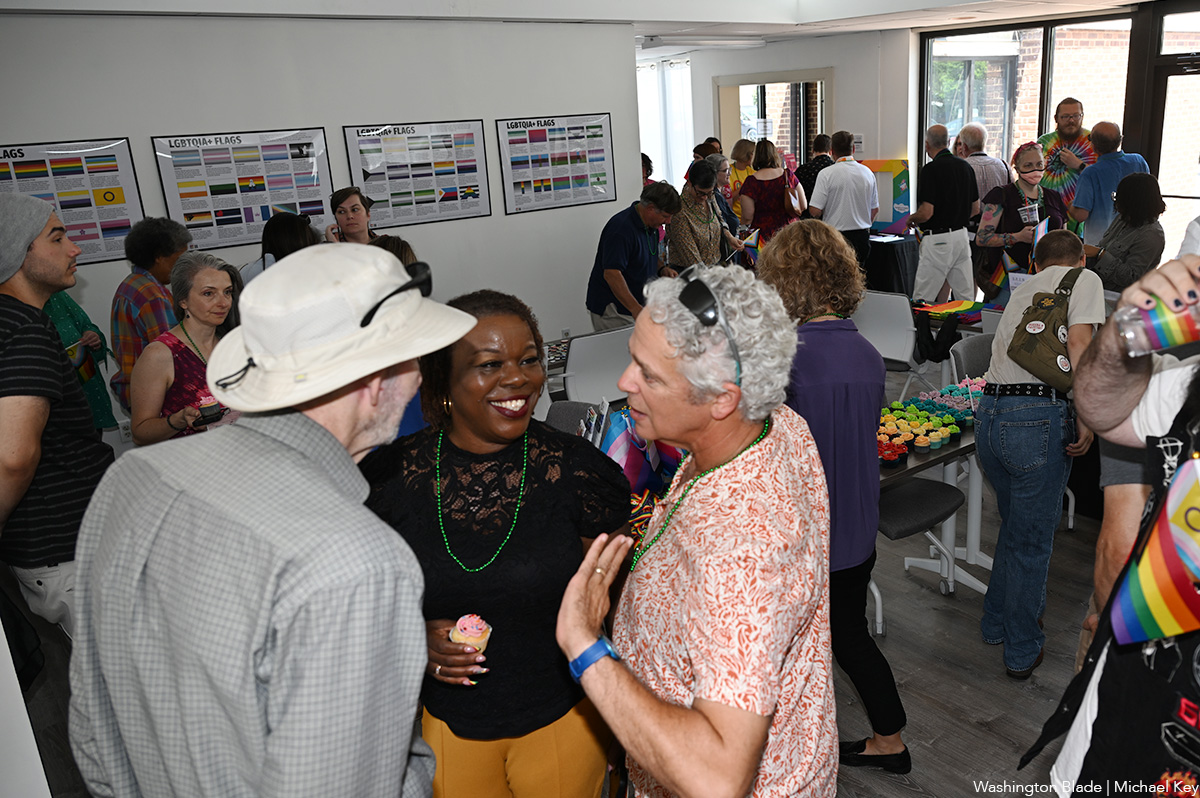
Maryland
Maryland’s oldest rural gay bar — and one of the last — is a log cabin in the woods
The Lodge is a Boonsboro watering hole resembling a log cabin
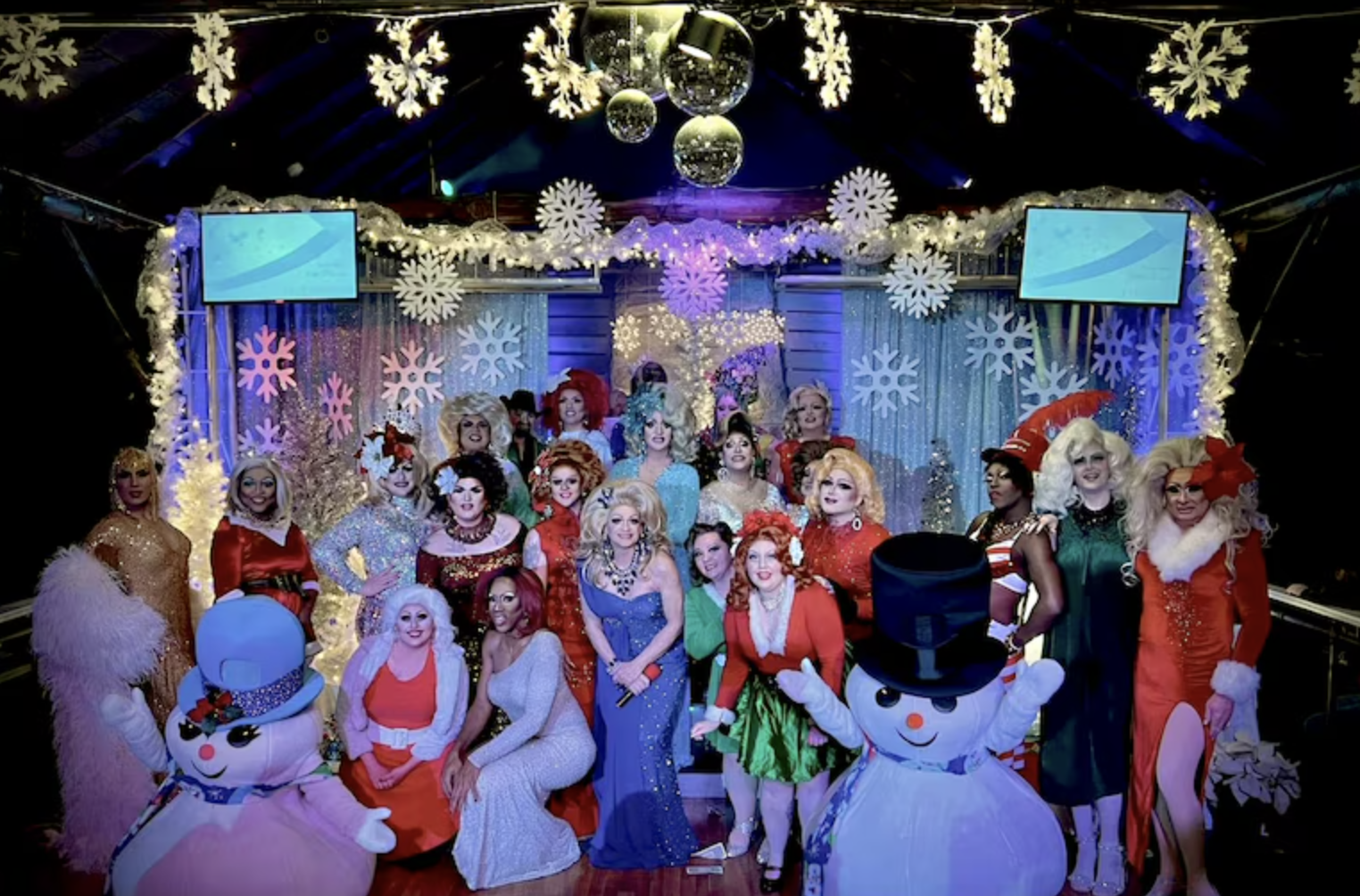
By SAPNA BANSIL | In the woods of a conservative Western Maryland town of fewer than 4,000 people is an unlikely landmark of state LGBTQ history.
The Lodge, a Boonsboro watering hole that resembles a log cabin, is Maryland’s oldest rural gay bar — one of a few remaining in the country, according to historians.
For about four decades, the Washington County venue has offered safety, escape and community to queer people far from large, liberal cities. Starting Friday night, The Lodge will close out Pride month with one of its biggest parties of the year: a weekend of dancing, drinking and drag in celebration of Frederick Pride, held about 20 miles away in the area’s largest city.
The rest of this article the Baltimore Banner published on June 27 can be read on its website.
Virginia
Va. court allows conversion therapy despite law banning it
Judge in June 30 ruling cited religious freedom.

In 2020, the state of Virginia had banned the practice of conversion therapy, but on Monday, a county judge ruled the ban violates the Virginia Constitution and Religious Freedom Restoration Act, allowing the therapy to start once more.
The conversion therapy ban, which can be seen in Va. Code § 54.1-2409.5 and 18VAC115-20-130.14, was overturned on June 30 as a result of two Christian counselors who argued that their — and all Virginia parents’ — constitutional right to freedom of religion had been encroached upon when the state legislature passed the ban.
A Henrico County Circuit Court judge sided with John and Janet Raymond, two Christian counselors represented by the Founding Freedoms Law Center, a conservative organization founded in 2020 following Virginia’s conversion therapy ban. Virginia’s Office of the Attorney General entered a consent decree with FFLC, saying state officials will not discipline counselors who engage in talk conversion therapy.
Conversion therapy, as the legislation described it, is considered to be “any practice or treatment that seeks to change an individual’s sexual orientation or gender identity, including efforts to change behaviors or gender expressions or to eliminate or reduce sexual or romantic attractions or feelings toward individuals of the same gender.” The ban’s reversal will now allow parents to subject their children to these practices to make them align better with their religion.
This decision comes despite advice and concern from many medical and pediatric organizations — including the American Psychiatric Association, American Psychological Association, American Association for Marriage and Family Therapy, and the American Counseling Association, to name a few — all of which denounce conversion therapy as dangerous and harmful to those subjected to it.
The American Medical Association, the largest and only national association that convenes more than 190 state and specialty medical societies, says that “these techniques are the assumption that any non-heterosexual, non-cisgender identities are mental disorders, and that sexual orientation and gender identity can and should be changed. This assumption is not based on medical and scientific evidence,” with attached data indicating people subjected to conversion therapy are more likely to develop “significant long-term harm” as a result of the therapy.
The AMA goes as far as to say that they outright “oppose the use of reparative or conversion therapy for sexual orientation or gender identity.”
FFLC has a clear goal of promoting — if not requiring — conservative ideology under the guise of religious freedom in the Virginia General Assembly. On their website, the FFLC argues that some progressive policies passed by the Assembly, like that of freedom from conversion therapy, are a violation of some Virginians’ “God-given foundational freedoms.”
The FFLC has argued that when conservative notions are not abided by in state law — especially when it involves “God’s design for male and female, the nuclear family, and parental rights” — that the law violates Virginians’ religious freedom.
A statement on the FFLC’s website calls gender dysphoria among children a “contagion” and upholds “faith-based insights” from counselors as equal — in the eyes of the law — to those who use medical-based insights. This, once again, is despite overwhelming medical evidence that indicates conversion therapy is harmful.
One study showed that 77 percent of those who received “sexual orientation change efforts,” or conversion therapy, experienced “significant harm.” This harm includes depression, anxiety, lowered self-esteem, and internalized homophobia. In addition, the study found that young LGBTQ adults with high levels of parental or caregiver rejection are “8.4 times more likely to report having attempted suicide,” with another study finding that “nearly 30 percent of individuals who underwent SOCE reported suicidal attempts.”
Virginia Senate Majority Leader Scott Surovell, a Democrat representing Fairfax, said that the overturning of the ban on religious merit disregards the entire concept of having professionally licensed counselors.
“I have no problem if somebody wants to go look at religious counseling from their priest or their minister, their rabbi, their imam — that’s perfectly fine,” Surovell told the Virginia Mercury. “When somebody goes to get therapy from somebody licensed by the commonwealth of Virginia, there’s a different set of rules applied. You can’t just say whatever you want because you have a license. That’s why we have professional standards, that’s why we have statutes.”
-

 U.S. Supreme Court5 days ago
U.S. Supreme Court5 days agoSupreme Court to consider bans on trans athletes in school sports
-

 Out & About5 days ago
Out & About5 days agoCelebrate the Fourth of July the gay way!
-

 Virginia5 days ago
Virginia5 days agoVa. court allows conversion therapy despite law banning it
-
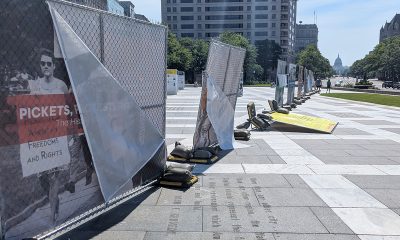
 Opinions5 days ago
Opinions5 days agoCommunity comes together to repair WorldPride history exhibition

